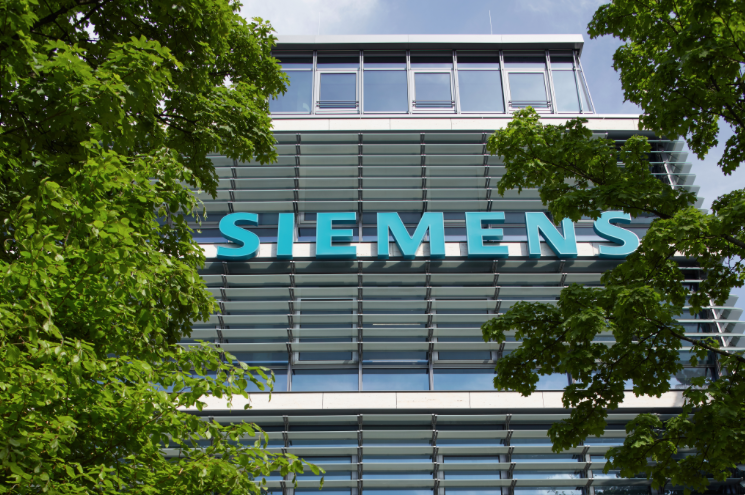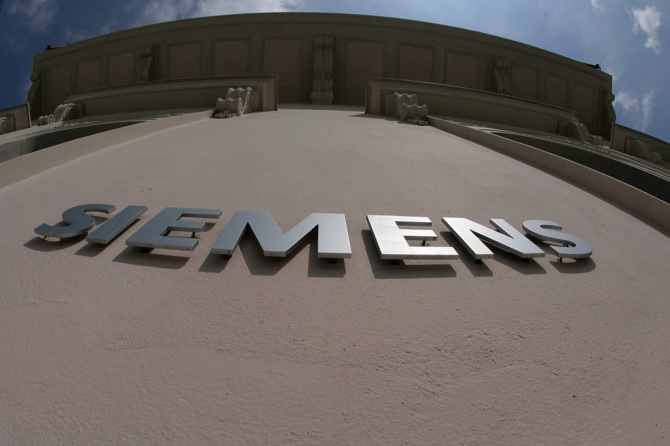Siemens shares settle over 2% higher as Siemens AG to buy 18% stake for 2.1 billion euros

Siemens shares settle over 2% higher as Siemens AG to buy 18% stake for 2.1 billion euros
Siemens AG’s decision to acquire an 18 percent stake in Siemens India for 2.1 billion euros, at approximately Rs 3,380 per share, has significant implications for both companies. This move involves the purchase of the stake from Siemens Energy.
The market’s response to this news was notable, with shares of Siemens experiencing a surge of around 3 percent. The closing price saw Siemens settling 2.2 percent higher at Rs 3,495.70 on the NSE after reaching an intraday high of Rs 3,568.80.

Siemens AG’s acquisition of a substantial stake in Siemens India suggests a strategic move to strengthen its position in the Indian market. Such transactions often have broader implications for the companies involved, influencing their market capitalization, strategic direction, and investor sentiment.
The acquisition at a specified price per share reflects the valuation agreed upon in the deal. Investors and analysts will likely closely monitor further developments and announcements from both Siemens AG and Siemens India regarding the implications, synergies, and strategic objectives associated with this significant stake acquisition.
The acquisition of an 18 percent stake in Siemens India by Siemens AG marks a notable shift in the ownership structure of Siemens India. Prior to the deal, Siemens AG held a 47.7 percent stake in Siemens India, and Siemens Energy owned 24 percent, according to the shareholding data at the end of the September quarter.

After the completion of the deal, Siemens AG’s stake in Siemens India is set to increase significantly, reaching nearly 66 percent. Conversely, Siemens Energy’s stake will decrease to 6 percent. Siemens Energy, being a subsidiary of Siemens AG, maintains a strategic relationship with its parent company.
This change in ownership structure implies a realignment of interests and control within Siemens India, with Siemens AG consolidating a more substantial position. The shift may be driven by strategic considerations, including a desire to streamline operations, enhance efficiency, or capitalize on growth opportunities in the Indian market.
Investors and industry observers will likely closely monitor how this change in ownership impacts Siemens India’s strategic decisions, business operations, and overall performance. Additionally, such moves can have implications for shareholder value and the companies’ ability to navigate the evolving dynamics of their respective markets.
The decision by Siemens Energy to sell the majority of its stake in the Indian joint venture, Siemens, to its parent company Siemens AG is part of a strategic move to fortify its balance sheet and enhance its capital base. This transaction aligns with financial restructuring goals and may provide Siemens Energy with additional financial flexibility.
In addition to the stake sale, Siemens Energy has proposed a demerger of the energy business of Siemens India. The demerger entails separating specific business segments or operations into distinct entities. As part of this proposal, Siemens Energy aims to acquire a controlling stake in the demerged energy business, further emphasizing the strategic repositioning within the Siemens Group.
Demergers are often undertaken to enhance focus on specific business areas, optimize operational efficiency, and facilitate strategic realignment. In this case, Siemens Energy’s interest in obtaining a controlling stake in the demerged energy business suggests a commitment to deepening its involvement in the energy sector within the Indian market.
For Siemens AG, the increased stake in the Indian joint venture signifies a greater influence and control over Siemens India. The move may be driven by a desire to consolidate operations, align strategies more closely, or position Siemens AG to capitalize on opportunities within the Indian market.
Overall, these strategic maneuvers highlight the complex and dynamic nature of corporate restructuring within multinational companies and their subsidiaries. The ultimate goal is often to enhance operational efficiency, financial stability, and strategic alignment with the evolving demands of the market.
Siemens Energy’s significant contribution to the total revenue and earnings of Siemens India underscores the importance of the energy business within the overall operations. Siemens Energy’s contribution of 33 percent to the total topline of Siemens India and 40 percent towards the consolidated business’s EBIT (Earnings Before Interest and Taxes) highlights its substantial impact on the financial performance of Siemens India.
The proposed corporate restructuring through the demerger of the energy business is expected to streamline Siemens India’s domestic operations. This strategic move could potentially create more focused and specialized entities, allowing for a clearer business strategy and operational efficiency.
Brokerage firm Prabhudas Lilladher’s positive outlook on the corporate rejig, along with the anticipation of streamlined operations, suggests that the demerger may unlock additional value for Siemens India. The firm’s price target of Rs 4,900 for the stock implies a significant upside potential of over 40 percent from the current levels, reflecting optimism regarding the potential benefits and enhanced valuations resulting from the restructuring.
Investors and market participants will likely closely monitor how this corporate rejig unfolds, as it can have a profound impact on Siemens India’s financial performance, strategic direction, and market positioning. The valuation upside projected by Prabhudas Lilladher indicates a positive market sentiment regarding the anticipated outcomes of the demerger and the overall corporate restructuring initiatives.
Bloomberg’s report on Siemens Energy considering a potential divestment in its Indian joint venture sheds light on the company’s ongoing strategic considerations. The news of this potential disposal coincides with Siemens Energy’s discussions with the German government, banks, and Siemens AG regarding the pursuit of 15 billion euros in guarantees to protect significant industrial projects.
In the context of these discussions, Siemens AG’s decision to allow Siemens Energy to use its 5 percent stake as collateral for guarantees adds a financial dimension to the broader strategic moves. Siemens AG’s offer to buy back the 5 percent stake for 750 million euros, in the event that Siemens Energy chooses to draw it out as collateral, introduces flexibility in the financial arrangements between the two entities.
The complexities of these financial and strategic maneuvers suggest a dynamic and multifaceted approach by Siemens Energy, Siemens AG, and other stakeholders. The discussions with the German government and banks for guarantees highlight the importance of securing financial support for Siemens Energy’s significant industrial projects, while the potential divestment in the Indian joint venture may be part of a broader effort to optimize the company’s portfolio.
The interplay between financial arrangements, divestment considerations, and broader strategic goals underscores the evolving nature of corporate strategies in response to economic conditions and market dynamics. Stakeholders and investors will likely monitor these developments closely for insights into Siemens Energy’s future direction and the outcomes of its discussions with various parties.




